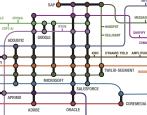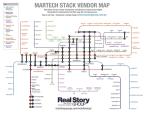Say hello to Machine Learning, the newest cloud marketplace
Marc Andreessen famously said that “software is eating the world.” One of the enablers of that march is "Machine Learning," and so Amazon's new “Machine Learning in the Cloud” services are worth noting.
Here is a quick primer on Machine Learning in the cloud, a snapshot of the leading vendors in this very nascent space (where Big Data, Analytics and Cloud converge), and some enterprise implications.

Figure 1: Paul the Octopus, a pioneer in the field of predictions as a service, passed away in 2010 but his work serves as inspiration for today's "Machine Learning Services in the Cloud: Image Source: IBTimes.com
What is Machine Learning?
Let’s face it – Machine Learning is a bit mystifying even for many of us in the software industry. Discussions about Machine Learning usually bring forth complex-sounding terms like Support Vector Machines, Naïve Bayesian Classifiers, and Hidden Markov Models – all which can be overwhelming if you do not have a background in computer science and math.
Well, you don’t need to know all such nitty-gritty of what goes on under the hood to appreciate Machine Learning use cases or explore applications in your industry/domain and understand what major players in the space are up to.
For our purposes, Machine Learning is simply a branch of computer science that uses some advanced mathematics and statistics to build algorithms that can make predictions by analyzing existing data to unearth patterns. The algorithms get better (i.e., they learn) as they crunch more and more data and receive feedback on the accuracy of their predictions.
Simply put, Machine Learning is a key piece of "predictive analytics" and so you could think of ML in the cloud is a "Predictions Service" or "Predictions as a Service."
What are the use cases?
Predictions can range a wide spectrum - from
- The simpler use cases (e.g., predicting whether an email is genuine or spam, or an online comment is spam or not) to
- The more complex like fraud detection (e.g., is a credit card transaction genuine or spurious?) and
- Shopping recommendations (which catalog items to promote, whether to offer a discount or not)
The applications are virtually limitless.
When it comes to the content management space, automated real-time translation of content, content personalization, and recommendations come to mind. We will explore the content management use cases more fully in a later briefing for our research subscribers, but for now, such applications are not as mature compared to the commerce use cases and hence may offer a opportunity to differentiate your business.
Who are the key players?
Amazon
The Amazon announcement has generated a lot of interest not only because they are one of the leading cloud infrastructure vendors but also because they are the text-book case for employing sophisticated machine learning algorithms. Not surprisingly, Amazon’s pitch is that now you can also leverage similar algorithms. Amazon offers a simple pricing structure – linked to the amount of data stored, time it takes to crunch your data, and the number of predictions (batch-mode or real-time) spewed out.
Microsoft
You don’t normally think of Microsoft as an early mover or a pioneer these days but Azure Machine Learning services have been available since last year. While the just-launched Amazon services currently offer a single predictive model / algorithm, Microsoft provides a few more additional models. You can also find a (currently sparse) marketplace to develop third party prediction services as well.
Google has been offering a Predictions API for a few years now but it does not appear to have actively/aggressively sold this service to enterprises. This appears to be changing with the launch of the Big Query (for analysis of Big Data) and Nearline Storage for data storage. Google also plans to launch a service called Data Flow (to get the data ready for analysis) in the near future.
IBM
IBM’s servers have been defeating world chess champions (Deep Blue) and trouncing jeopardy winners (Watson). Watson platform services are available in the cloud as well. True to form, Big Blue is focusing on the higher-end of the market for such services, compared to the more do-it-yourself approach of an Amazon or a Google.
Note that in addition to the big vendors, there are several start-ups and vertical specialists as well.
Enterprise Implications
So, early days. For you the customer, I leave two interim thoughts:
- Traditionally, companies employed teams of data analysts and statisticians and bought (expensive) tools like SAS and SPSS to build predictive models. In the long-term, prediction services in the cloud model can upend that approach.
- Nevertheless, while Machine Learning itself is not new, Machine Learning services in the cloud are relatively new and not very mature yet. But they offer you an interesting avenue to experiment. You can try out a few pilots and test your own readiness to integrate them into your use cases, technology architectures, and business processes.








